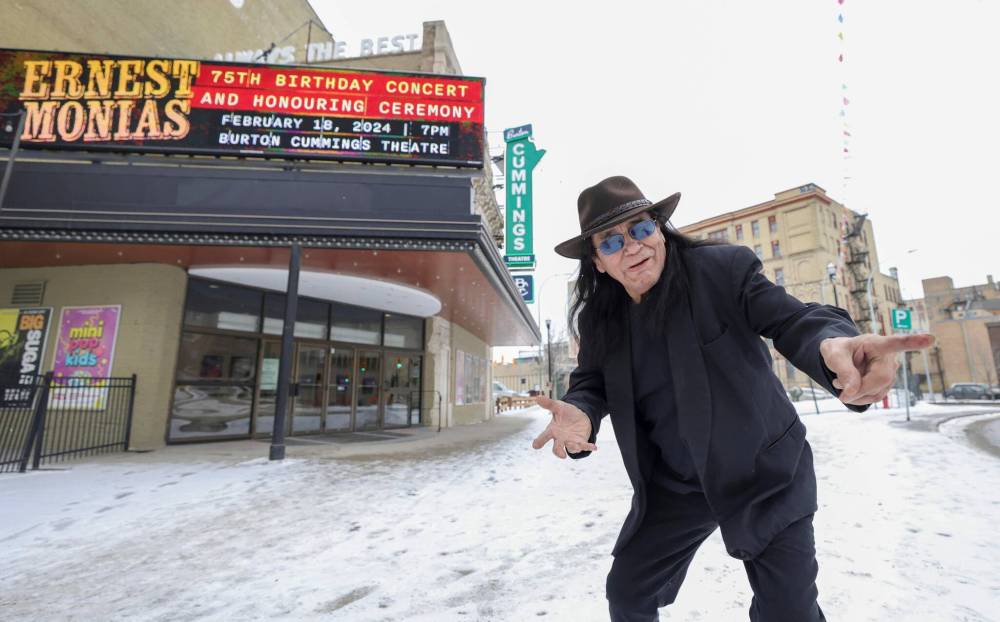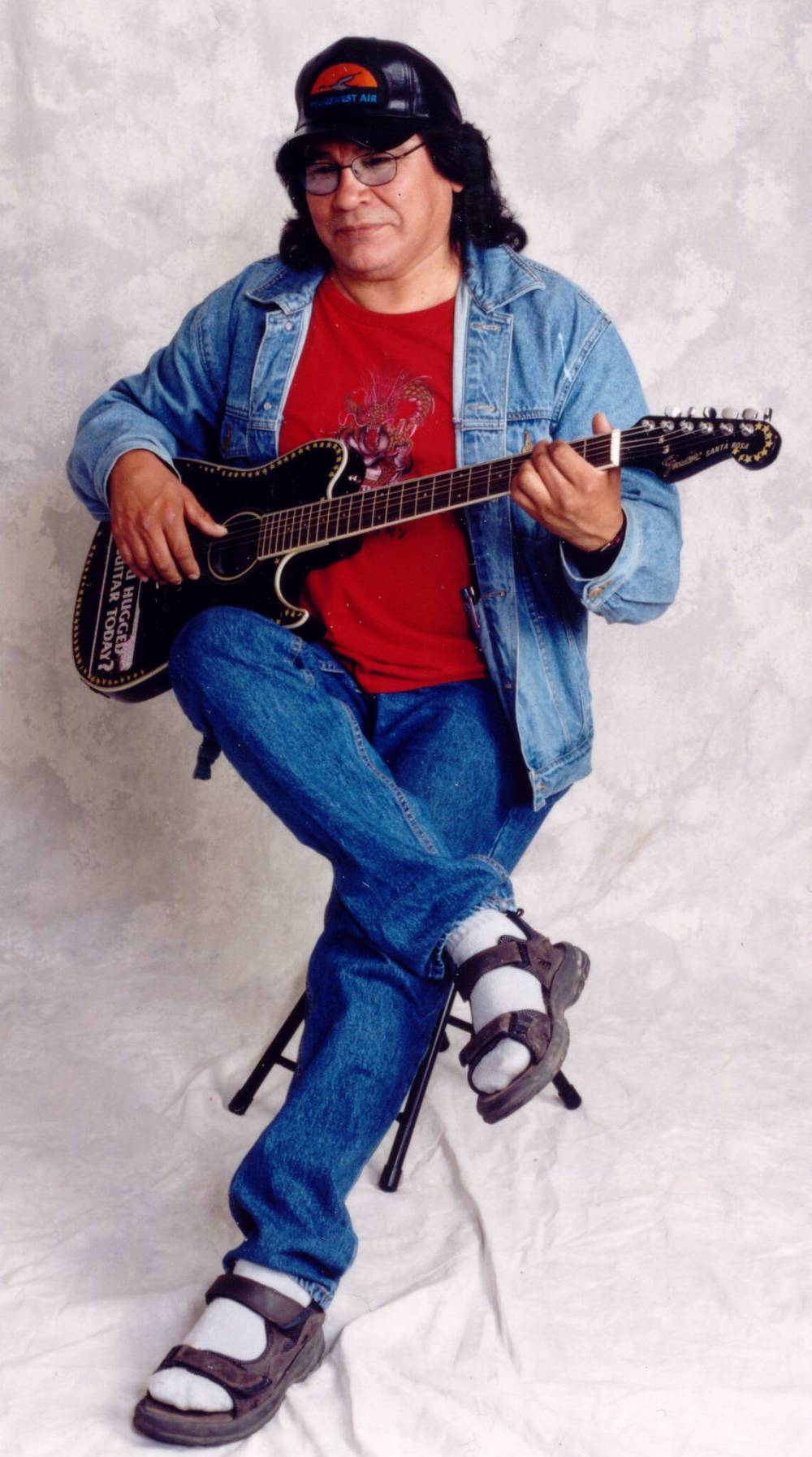Honouring ‘Elvis of the North’ Musicians gather at the Burt to celebrate trailblazing Indigenous country-rocker’s 75th birthday
Read this article for free:
or
Already have an account? Log in here »
To continue reading, please subscribe:
Monthly Digital Subscription
$0 for the first 4 weeks*
- Enjoy unlimited reading on winnipegfreepress.com
- Read the E-Edition, our digital replica newspaper
- Access News Break, our award-winning app
- Play interactive puzzles
*No charge for 4 weeks then price increases to the regular rate of $19.00 plus GST every four weeks. Offer available to new and qualified returning subscribers only. Cancel any time.
Monthly Digital Subscription
$4.75/week*
- Enjoy unlimited reading on winnipegfreepress.com
- Read the E-Edition, our digital replica newspaper
- Access News Break, our award-winning app
- Play interactive puzzles
*Billed as $19 plus GST every four weeks. Cancel any time.
To continue reading, please subscribe:
Add Free Press access to your Brandon Sun subscription for only an additional
$1 for the first 4 weeks*
*Your next subscription payment will increase by $1.00 and you will be charged $16.99 plus GST for four weeks. After four weeks, your payment will increase to $23.99 plus GST every four weeks.
Read unlimited articles for free today:
or
Already have an account? Log in here »
Hey there, time traveller!
This article was published 14/02/2024 (672 days ago), so information in it may no longer be current.
Ernest Monias is an elder of a different sort, a residential-school survivor who plays a mean guitar and has blazed a trail for future generations of Indigenous performers.
Concert preview
Ernest Monias 75th birthday concert and honouring ceremony
● Sunday, 7 p.m.
● Burton Cummings Theatre
● Tickets: $40.50-$73.50 at ticketmaster.ca
He’s also known as “Elvis of the North” and “King of the North,” owing to his musical prowess and for growing up in Cross Lake, known today as Pimicikamak Cree Nation, about 800 kilometres north of Winnipeg.
Monias turns 75 on Sunday, and the country-rocker will celebrate the milestone by headlining a concert at the Burton Cummings Theatre, where an honouring ceremony will also be held.
“I want to thank all the fans out there who supported me over the years. That’s who got me here,” Monias says. “We’re practising Friday night and Saturday night, making sure we’re all polished up.”
Monias has performed for 60 years, a regular act at Winnipeg clubs, but also at treaty days, hockey tournaments and other events at First Nations across Canada, and even remote communities in the Arctic.
He was inducted into the Manitoba Aboriginal Music Hall of Fame in 2005 and received a lifetime achievement award from the Indigenous Music Awards in 2019.
His legend is not forgotten among some of today’s Indigenous artists, some of whom have followed in Monias’s footsteps and found greater fame along the way.
“Truly an inspiration and one of the first names I heard out here,” says William Prince, the Juno Award-winning singer-songwriter from Peguis First Nation.
RUTH BONNEVILLE / WINNIPEG FREE PRESS Longtime country rocker Ernest Monias, who is originally from Cross Lake but has been criss-crossing the country for 60 years, turns 75 on Sunday and is headlining a concert at the Burton Cummings Theatre.
“I think of C-Weed, Eagle and Hawk, and Ernest Monias when I think of country music, when I think of rock ’n’ roll that was the Indigenous scene that was felt and heard at the Peguis First Nation.
“He’s definitely the backbone of the legends, for sure.”
Monias, like many Indigenous artists in the 1960s, ’70s and ’80s, had difficulty getting gigs in traditional venues in Winnipeg. He had to play bars with some of the roughest reputations — among his albums is a live concert recorded at the Westbrook Hotel on Keewatin Street — so he isn’t well known among white audiences.
“In that situation, we’re not only separated from the city life, we’re also very separated by poverty, separated by race, so it’s a little bit difficult to break through,” says Errol (C-Weed) Ranville, who was 16 when he first met Monias at a C-Weed Band show in Cross Lake in the 1970s.
Long before Monias became Elvis of the North, he was, like so many Indigenous kids in Canada, taken from his home and sent to a residential school, in his case one near Portage la Prairie, hundreds of kilometres from where he grew up.
“He’s definitely the backbone of the legends, for sure”–William Prince
It was there that he began learning the guitar; he was also part of a residential school choir that performed at Expo 67 in Montreal.
It wasn’t long after that he struck out on his own, leading a band called the Sons of Manitou, and later Ernest Monias and the Shadows, singing and performing songs of his favourite artists, including country stars Hank Williams and George Jones.
He was a solo act in 1980 when he signed a deal with Sunshine Records, a Winnipeg label that focused on folk-music acts such as Winnipeg fiddling legend Reg Bouvette and Walter Ostanek, Canada’s polka king.
Sunshine, which gave Monias his “Elvis of the North” moniker to build publicity, has 19 of his albums in its back catalogue, ranging from his versions of country favourites and gospel numbers to Monias’s originals.
Those records were recently added to streaming services, allowing younger audiences to boogie along with songs such as If I Wanted You Girl, which Monias wrote in 1978.
Another career highlight came in 1987, when Monias returned to Cross Lake to open a concert for Jones, his idol and the country-music legend known for He Stopped Loving Her Today.
While Monias built his career like many country artists, singing about loves and lost loves, it was a tune with a political focus that is a big part in his recent revival.
Tormented Soul takes him back to Cross Lake, where Monias laments the damage to the nearby land and rivers caused by hydroelectric dam projects.
It became part of the recording Native North America Vol. 1, a compilation of several Indigenous artists compiled by Kevin Howes, a producer and musicologist, which earned a Grammy Award nomination for best historical album in 2015.
SUPPLIED Ernest Monias in 2006
“Before, it was all nice, pristine water, you could see the bottom of the rivers,” Monias says. “We don’t have that anymore. All the erosion on the rivers, destruction.”
Joining Monias on stage Sunday will be some of his longtime musical friends, including the C-Weed Band, Winnipeg bluesman Billy Joe Green, Murray Porter, a blues artist from Six Nations of the Grand River in Ontario, and Monias’s son’s band, Delaney Monias and Blue Highway, who were part of an Ernest Monias album of classic-rock covers.
The honouring ceremony will include a star-blanket presentation attended by dignitaries such as Cathy Merrick, grand chief of the Assembly of Manitoba Chiefs, and Eric Robinson, who was Manitoba’s deputy premier from 2009 to 2016.
Ranville, who is helping produce Sunday’s show, hopes the recognition will broaden the appeal of Monias’s music.
“He’s worked without a net all these years, so that’s why I think it’s important to acknowledge him and present him to the general public,” Ranville says.
There are plenty of longtime fans who recognize Monias wherever he goes, and the King of the North has found the crown can be a heavy load.
“People walking up to me, wanting this and that,” he says. “Selfies, man — I can’t even go to Polo Park.”
Alan.Small@winnipegfreepress.com
X: @AlanDSmall

Alan Small
Reporter
Alan Small was a journalist at the Free Press for more than 22 years in a variety of roles, the last being a reporter in the Arts and Life section.
Our newsroom depends on a growing audience of readers to power our journalism. If you are not a paid reader, please consider becoming a subscriber.
Our newsroom depends on its audience of readers to power our journalism. Thank you for your support.
